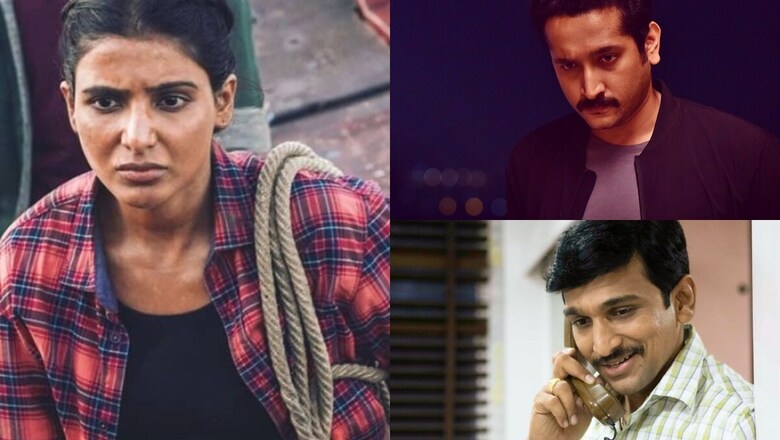
views
Covid-19 pandemic has changed our lives in many ways and one of them is the way we watch films. OTT platforms are the new cinema halls for movie goers… we mean movie watchers – you don’t need to go anywhere now to watch films, other than from one room to another in your homes.
As your watching experience has evolved, so has the content. The Manoj Bajpayees, Ayushmann Khurranas and Pankaj Tripathis of Bollywood have replaced the Khans – Salman, Shah Rukh and Aamir. There are more films with actresses as protagonists, but the A-listers have stayed away so far.
Films have become shorter, and some are just a collection of short films put together – an anthology. Web series trend, and are hot favourites. Potboilers and mass entertainers have made way for subtle, more meaningful cinema. Not to worry, the former films are there too.
In this series, OTT Trends, News18 looks at how streaming platforms have redefined Indian cinema, blurred lines between mainstream and indie, cut across language barriers, made actors into stars, and above all, brought entertainment at your fingertips.
Unlike film industries in India, there are no territories demarcated on OTT platforms. As a result, the audiences are finally seeing artistes on screen who look like them or share their cultural values, with filmmakers and studios understanding the importance of diverse and authentic representation. “There’s a huge talent pool in other industries especially in the South and none of us in the Bollywood and Hindi film industry have had the opportunity to tap into them,” says Krishna DK, co-creator of The Family Man, which set new benchmarks for diversity in Indian cinematic narrative, as he talks about how making the spy thriller web series on a streaming platform helped him and Raj Nidimoru preserve the cultural identities of their characters.
While the debate around representation continues to wreak havoc on the film industry, streaming services’ production of original and local content has given it an edge on diversity. “Once in a while you pull somebody and put them in a Hindi film but otherwise, we have really not tapped into that so it just made our platter larger to choose from. We were choosing from 10 talented actors in Hindi and now we have 10 talented actors here to choose from and 10 more from there so suddenly you’re picking the cream of the crop everywhere,” notes DK at MAMI’s Dial M for Films session.
More inclusive approach to casting
Parambrata Chattopadhyay, one of the most loved and respected actors in the Bengali cinema, says with the emergence of OTT platforms, filmmakers and producers are opening their doors to more diverse talent who previously may have been overlooked. “We have gotten a chance to work with a diverse range of things, think about different kinds of audiences, and explore mature content, which was improbable even a few years ago. We have come across new faces, new talents, and new voices- from sixteen to sixty-five. We have been able to tap into these talents, and that is the best thing this platform has brought into the modern world,” says Chattopadhyay, who garnered immense appreciation for his incredible performances in Netflix’s original film Bulbbul and ZEE5’s web series Black Widows.
DK, on the other hand, says even though OTT platforms are pushing to become better in terms of reflecting diversity, it’s not always easy to do representative casting. “For example in the first season of The Family Man, we did have a little bit of trouble with the casting for the Kashmiri characters because the Kashmiri film industry has not thrived or evolved as much as other industries so it was a little difficult in that sense but the moment you go South, be it Malayalam, Tamil or Telugu, the industries are so evolved. It’s like you get to pick the best.”
In an interview last year, South star Samantha Akkineni had admitted that if it wasn’t for OTT platforms, she wouldn’t have made her debut in the Hindi language. The actress delivered a jolting performance as Sri Lankan Tamil rebel, Raji, in The Family Man 2. “The exposure to regional cinema has improved a lot as there are a lot of films on OTT and it leads to more opportunities for us. When I was given an opportunity to do a web series and play a role that is different, I jumped at it,” Akkineni had told news agency PTI.
Staying true to the spirit of cultures and languages
DK says that the most liberating thing about working on an OTT platform is that one can actually stay true to the spirit of multiple languages and cultures “without having to hold back.” Echoing a similar sentiment, Raj Nidimoru credits Amazon Prime Video for giving space to a more diverse ecosystem. “They didn’t say a single word that why there’s so much Tamil in the second season. I quote Vijay Subramaniam (Director and Head of Content at Amazon Prime Video India) when he saw the first scene (of season 1) unfold in Malayalam– he said ‘This is a true pan-India show where we have arrived as a filmmaking community and are accepting India as a whole.’ You can put it anywhere and use the people from there and use a language and culture from there. So, one of our biggest excitements in doing the Family Man is the fact that you can travel anywhere with it and be very local in its flavour. But yeah it might not be easy for all the usual pictures but I guess we got very lucky.”
Democratising the industry in the truest sense
The role of infamous stockbroker Harshad Mehta in the 2020 web series Scam 1992 has launched Pratik Gandhi, primarily an actor in Gujarati theatre and cinema, into mainstream space as one of the most in-demand actors. His incredible transformation and nuanced performance as the controversial stockbroker truly heralded the arrival of a fearless talent in mainstream cinema. Talking about how the show’s immense success changed his life, Pratik earlier shared on a Humans of Bombay post, “I didn’t realise it would become this huge. It was so overwhelming. And when Shabana Azmi ma’am told me it was the best performance she had seen in 20 years, I was in tears. It’s been 5 months since Scam’s release and my life has taken a 180-degree turn. People see me as a ‘lead actor’ now.”
Recently, actor-producer Priyanka Chopra Jonas spoke at length about how streaming platforms helped remove barriers for those who were traditionally shut out by the mainstream film industry. “When I started making regional movies six years back it was still very nascent in becoming mainstream but now you can see regional cinema from India dominating charts in the US and China. I think there is a massive hunger from the South Asian communities to see their own localised content and themselves being represented. With streaming services being able to provide that platform, I think people everywhere will feel represented,” she said at the ZEE5 launch in the US.
Priyanka, who’s herself been creating opportunities for diverse stories and talents through her production house Purple Pebble Pictures, described the changes happening throughout the industry as long overdue. “Now, people want to tell great stories that are real and they identify with. It’s amazing because it gives new writers, actors and filmmakers an opportunity to come into an industry that was monopolised for a very long time by a very specific number of people. It’s really great time for growth, entertainment, and specifically for Indian cinema.”
Well, without a doubt, streaming services have considerably more diverse stories and talent representation than any other medium or film industry today. Though the playing field is still far from even, the future definitely looks bright.
Read all the Latest News, Breaking News and Coronavirus News here.














Comments
0 comment